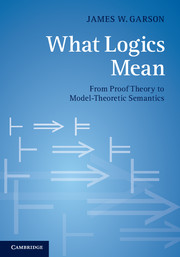Book contents
- Frontmatter
- Dedication
- Contents
- Preface
- Acknowledgements
- 1 Introduction to model-theoretic inferentialism
- 2 Deductive expression
- 3 Local expression
- 4 Global expression
- 5 Intuitionistic semantics
- 6 Conditionals
- 7 Disjunction
- 8 Negation
- 9 Supervaluations and natural semantics
- 10 Natural semantics for an open future
- 11 The expressive power of sequent calculi
- 12 Soundness and completeness for natural semantics
- 13 Connections with proof-theoretic semantics
- 14 Quantifiers
- 15 The natural semantics of vagueness (with Joshua D. K. Brown)
- 16 Modal logic
- Summary
- References
- Index
8 - Negation
Published online by Cambridge University Press: 05 June 2014
- Frontmatter
- Dedication
- Contents
- Preface
- Acknowledgements
- 1 Introduction to model-theoretic inferentialism
- 2 Deductive expression
- 3 Local expression
- 4 Global expression
- 5 Intuitionistic semantics
- 6 Conditionals
- 7 Disjunction
- 8 Negation
- 9 Supervaluations and natural semantics
- 10 Natural semantics for an open future
- 11 The expressive power of sequent calculi
- 12 Soundness and completeness for natural semantics
- 13 Connections with proof-theoretic semantics
- 14 Quantifiers
- 15 The natural semantics of vagueness (with Joshua D. K. Brown)
- 16 Modal logic
- Summary
- References
- Index
Summary
We have already discussed intuitionistic logics that define ~ by ~A =df A→⊥. However, let us now consider the possibility that ~ is a primitive symbol of the language. In light of the ~ Definition Theorem of Section 6.4, it will come as no surprise that the natural deduction (ND) rules for intuitionistic negation express the intuitionistic truth condition ‖¬‖ (Section 8.1). More interesting results surface when we ask what is expressed by S~, the classical ND rules for negation (Section 8.2). It turns out that the condition ‖S~‖ that S~ expresses is intuitionistic, but it also includes a side condition ‖LL‖ corresponding to the requirement that (Double Negation) preserves validity. Sections 8.3–8.4 will explore the content of ‖LL‖. In Section 8.5, ‖LL‖ is recast in a form ‖LL′‖ that mentions no connective. Questions are raised about whether ‖S~‖ is a legitimate semantics for ~. The idea that ‖S~‖ is not acceptable is supported in Section 8.6, where it is shown that ‖S~‖ is not functional. That negative opinion of ‖S~‖ is tempered somewhat in Section 8.7, where it is shown that ‖LL′‖ makes a positive contribution to resolving the serious problems (discussed in Section 7.3) that bedevil the condition ‖∨‖ expressed by the disjunction rules S∨. Section 8.8 shows that despite the non-functionality of ‖S~‖, the condition ‖PL‖ expressed by the classical rules PL for negation and the other connectives is isomorphic to a perfectly respectable semantics, one that has already appeared in the literature. In light of that result, the situation is reassessed (Section 8.9). ‖PL‖ is defended by arguing that ‖LL‖ has nothing to do with the truth conditions for negation, and that therefore the meaning for negation expressed by the classical rules is intuitionistic.
Chapters to come will underscore the virtues of ‖PL‖. Chapter 10 deploys ‖PL‖ as a logic for an open future, and a foundation for systems that can handle human agency. Chapter 15 shows that ‖PL‖ is especially well suited for solving serious problems faced by supervaluation accounts of vagueness. Alien anthropologists who discover that we employ classical natural deduction rules for our reasoning will conclude that ‖PL‖ tells us what we mean by the connectives (if anything does). The upshot is that whether we adopt intuitionistic or classical ND rules, what we mean by ~ is intuitionistic.
- Type
- Chapter
- Information
- What Logics MeanFrom Proof Theory to Model-Theoretic Semantics, pp. 105 - 133Publisher: Cambridge University PressPrint publication year: 2013



